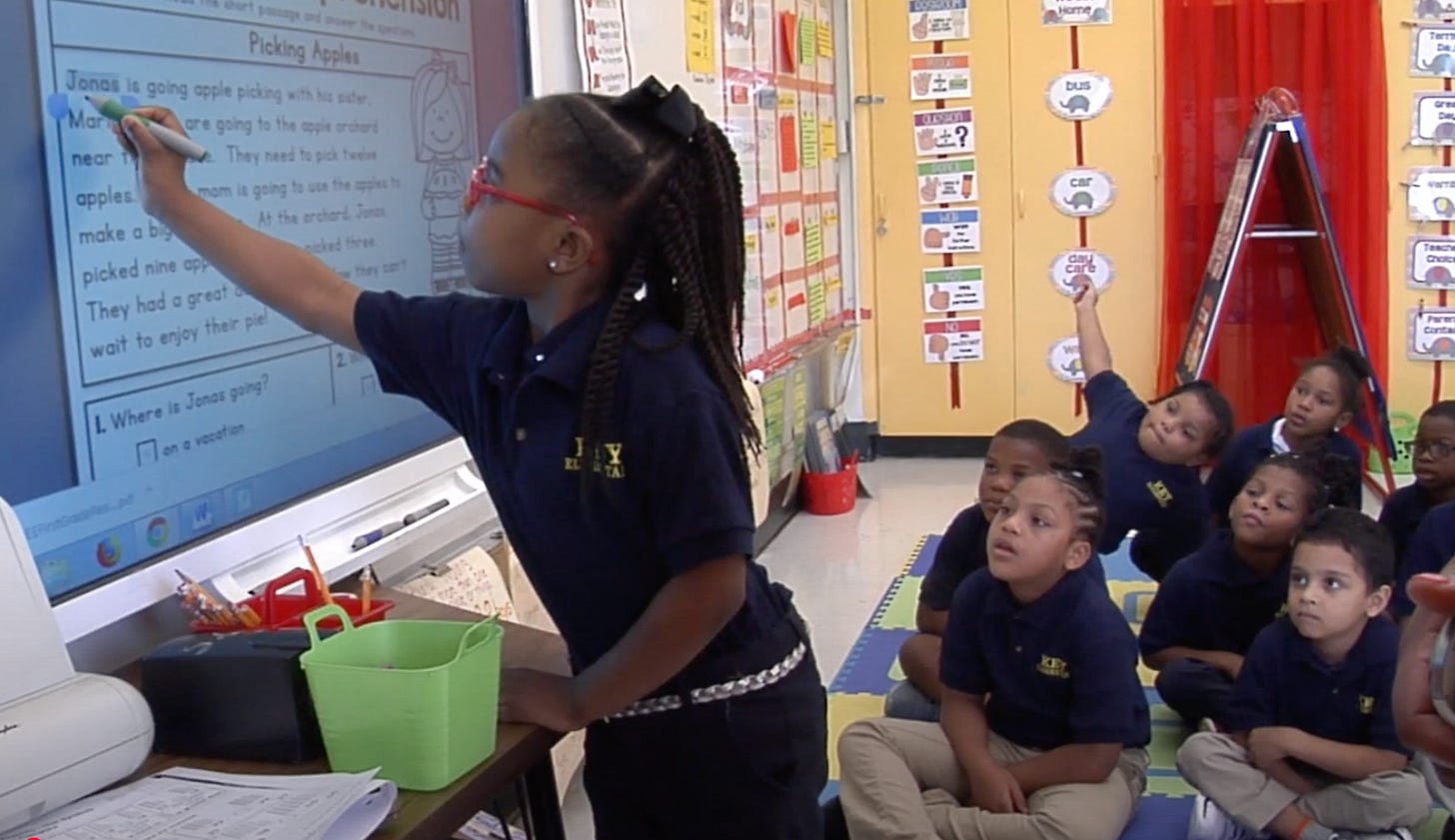Dan Plonsey posted a reply (← link) that I wanted to make sure everyone had a chance to see. There were quite a few interesting and thoughtful comments about our email exchange. I realize not everyone is going to burrow deep into the comments, so fwiw here’s a link that goes right to them.
I also got an email from Devika Sood, a literacy systems improvement coach with FULCRUM (Fulcrumliteracy.org), an literacy advocacy organization co-founded and helmed by Kareem Weaver, with which many of you are probably familiar.
Devika has been to Mississippi, seen what they’ve done, and had some thoughts about Dan’s comments.
I’m happy to post her reply here, with her permission:
I heard Mr. Plonsey's skepticism about Mississippi success—growth from 49th to 9th in 4th grade reading proficiency on NAEP.
It's helpful to consider a few key practices that were implemented. After the legislation was passed, the MS Dept of Ed trained and funded about 270 state literacy coaches for schools that needed support based on student achievement data. All staff at those schools were trained in the science of reading and structured literacy practices then provided ongoing coaching support throughout the year. Along with the law providing a list of approved curriculum and tracking 3rd grade reading data very closely, the legislation strategically funded a person dedicated to coach the educators at the school using a gradual release model (until teacher practice and student achievement were sustained).
It wasn’t just the legislation that was passed but the funding, oversight, and support from the state dept of ed. We know our principals are instructional leaders, but they get pulled in so many directions it's hard to keep coaching time sacred. Having a state coach come in to build the leader’s knowledge and skills and co-observe and co-coach with them and provide professional learning and coaching directly to staff, without any constraint from being pulled in any other direction, allowed literacy to stay in focus. This was a key lever in MS’s success.
Slowly but surely, over the last decade, the MS department of education keeps gradually releasing schools off literacy coaching support and achievement is sustaining with educators and leaders confident in their ability to ensure all of their students can read. They've even created science of reading distinguished schools awards and when schools meet the rubric criteria for literacy best practices and student achievement--they send a media team out and really celebrate the school community.
It's important to note that the Literacy Promotion Act is a Birth-21 bill that includes universal screener, approved materials and methodologies, required and funded SOR professional learning for all educators and leaders (through Aim Pathways), and teacher ed prep alignment. The 3rd grade pass rate often overshadows all the pieces in the legislation.[1] See “Note from CG” below.
I hope this helps remove the skepticism.
I visited an elementary school there last October where we did a learning walk along with 20 community members and educators from nearby districts. The school went from 3rd grade reading proficiency below 17% and a pass rate of 43% in 2022 to reading proficiency of nearly 50% and pass rate of 85%. The average income in the county is $30,000.
Yes, our students of color and low income students can learn to read proficiently. This ultimately unlocks a choice full life. I hope that AB1121 is passed so that our educators and leaders can finally have the funding and support they need from our state to make the shift to structured literacy and accelerate this change effort so that all of our students can both learn to read and read to learn. There is nothing educators want more than to see their students thrive and succeed and lead choice filled lives.
[1] Note from CG: The “no social promotion” part of the Mississippi Literacy-Based Promotion Act has attracted a great deal of attention and generated much skepticism about the state’s striking improvement in reading achievement. An insightful analysis by former Palo Alto school board member Todd Collins has demonstrated that MS’ grade retention rate has always been high and has remained consistent since passage of the Act. This means that increased retention rates cannot explain the dramatic increase in reading scores for the simple reason that there was no such increase in retention rates. Collins notes that “The average age of Mississippi’s fourth grade test-takers was almost identical in 2002 and 2017; increased retention should have raised the age. That suggests that Mississippi has long had a higher retention rate than most states.”
Sincere thanks to Dan and Devika for their engagement and obvious concern for children’s welfare.
For me personally, the (not particularly original) take-away is that there are many facets involved in the struggle for social justice and equitable opportunities for all children. The political struggle to base reading policies on what we’ve learned from reading research is important, in large part because too many teachers have not had the opportunity to learn this body of knowledge, to their and their students’ detriment. The problems are complex and not easy to fix. But fixed they must be if we’re to make progress on this front.
But so we must confront the other challenges to justice and equity Dan names—health care disparities, guns (out of) control, obscenely skewed economics, trampled workers’ rights (although tbh I worry about CTA’s rights to quash reforms that would lead to better and research-based reading policies; maybe we can take this up separately)—and that Dan indirectly alludes to: An detestable federal administration that we must rally to oppose, in Dan’s terms, engage in “collective actions.”
(While I’m in this lane, may I recommend this article, which you should be able to get even if you don’t subscribe to The NY Times.)
As always, please
And if you haven’t yet, feel free (bc it really is free) to





Wow! Thank you, Devika, for such an excellent analysis!